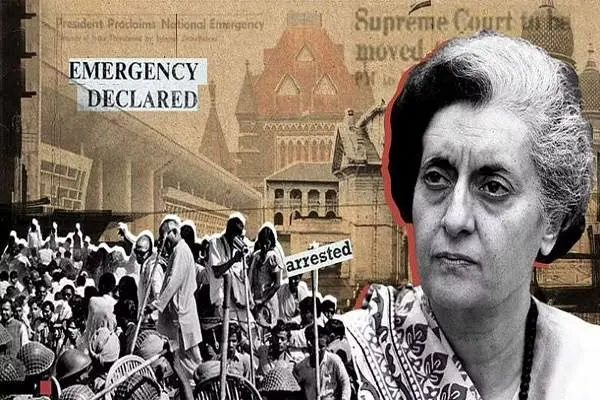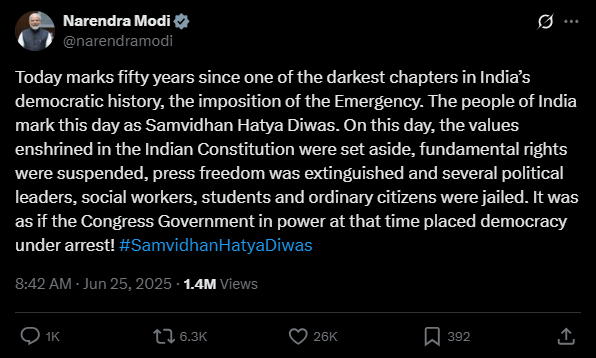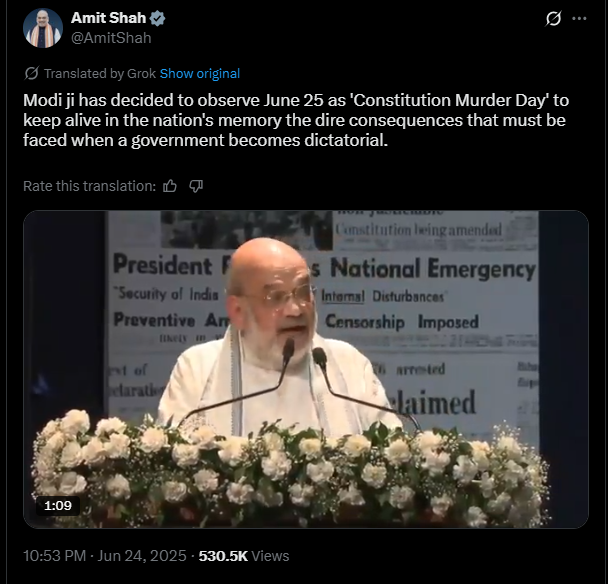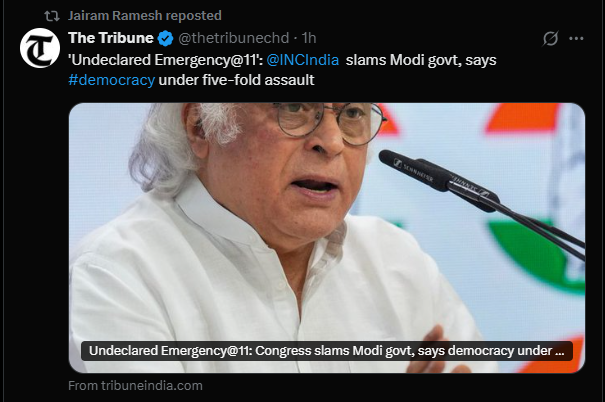Today, India marks the 50th anniversary of one of the most controversial and defining periods in its democratic history—the imposition of Emergency on June 25, 1975. The day is being officially observed as ‘Samvidhaan Hatya Diwas’ (Constitutional Murder Day) to remember the suspension of democratic rights, censorship, and authoritarian excesses that followed.
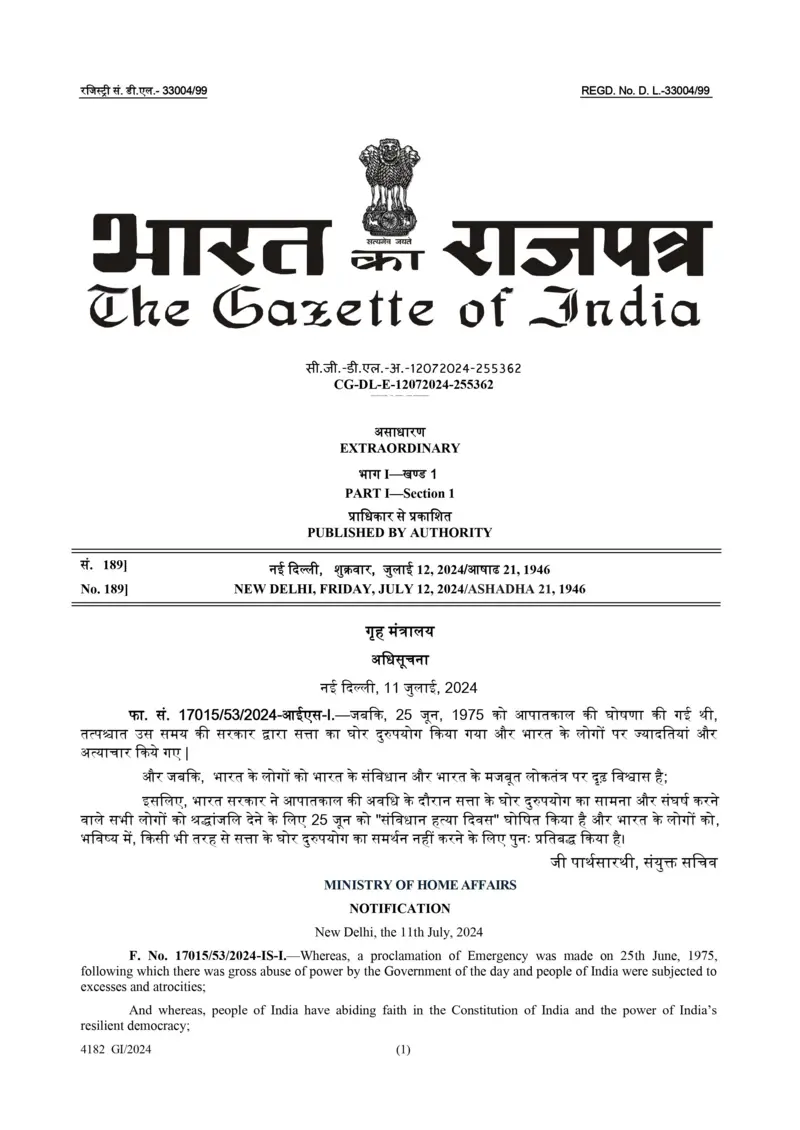
In a Gazette notification, the Government of India declared that this observance pays tribute to all those who suffered and resisted the Emergency’s misuse of power, and reaffirms the nation’s commitment to democracy and constitutional values.
What Happened on June 25, 1975?

On this day in 1975, then President Fakhruddin Ali Ahmed declared a National Emergency under Article 352, citing “internal disturbance” at the behest of Prime Minister Indira Gandhi’s government. The move followed political unrest and a court verdict invalidating Gandhi’s election, triggering a period of unprecedented executive control.
Key consequences of the Emergency included:
-
Suspension of Article 19 (freedom of speech, expression, assembly, and movement) via Article 358.
-
Censorship of the press, with even the Press Council of India abolished.
-
Mass arrests of opposition leaders, activists, and dissenters.
-
Bar on judicial review of the Emergency proclamation and election of key leaders through constitutional amendments.
Voices Then and Now
Eminent journalist Ram Bahadur Rai, who was imprisoned during the Emergency, recalled the atrocities and silencing of dissent in a statement to Akashvani.
In his Mann Ki Baat broadcast, Prime Minister Narendra Modi referred to the Emergency as the “darkest chapter in Indian democracy“, where “atrocities were committed on those who stood for democratic values.”
BJP’s Official Observance and Statements
Prime Minister Narendra Modi, in a widely circulated social media post, referred to the Emergency as “one of the darkest chapters in India’s democratic history.” He said:
“The people of India mark this day as Samvidhan Hatya Diwas. On this day, the values enshrined in the Indian Constitution were set aside, fundamental rights were suspended, press freedom was extinguished and several political leaders, social workers, students and ordinary citizens were jailed.”
“It was as if the Congress Government in power at that time placed democracy under arrest.”
Home Minister Amit Shah also addressed the nation, stating that:
“Modi ji has decided to observe June 25 as ‘Constitution Murder Day’ to keep alive in the nation’s memory the dire consequences that must be faced when a government becomes dictatorial.”
His remarks were made during a public address backed by visuals from 1975 newspaper clippings referencing censorship and preventive arrests.
Congress Hits Back: ‘Undeclared Emergency’ Under Modi Govt
As the government marked June 25 as ‘Samvidhaan Hatya Diwas’, the Congress party countered with strong criticism, accusing the current administration of imposing what it called an “Undeclared Emergency.”
Congress General Secretary Jairam Ramesh amplified this message through a repost from The Tribune, stating:
“Undeclared Emergency@11: @INCIndia slams Modi govt, says democracy under five-fold assault.”
In a separate quote, he further alleged:
“The killers of Mahatma Gandhi are glorified. Minorities live in fear of their lives and property. Dalits and other marginalised groups have been disproportionately targeted, and ministers making hate speeches have been rewarded with promotions.”
The “five-fold assault” mentioned by the Congress refers to alleged attacks on:
-
Freedom of speech and expression
-
Judicial independence
-
Electoral integrity
-
Institutional autonomy
-
Social justice and minority rights
The Congress has framed the BJP’s observance of ‘Samvidhaan Hatya Diwas’ as politically motivated, accusing the government of using history selectively while overlooking present-day democratic backsliding.
While ‘Samvidhaan Hatya Diwas’ is meant to remind citizens of the dangers of unchecked executive power, it also prompts reflection on how far India has come—or not—from those days.
As the nation commemorates the Emergency’s 50th anniversary, it becomes not just a remembrance of the past but a litmus test for the present, challenging leaders, institutions, and citizens to uphold the very principles that were once suspended.






